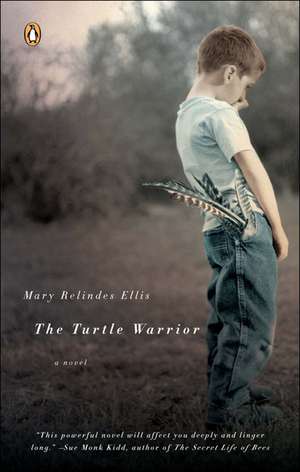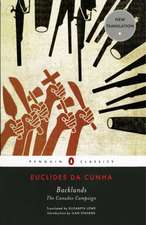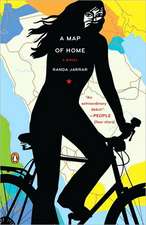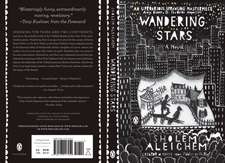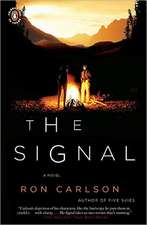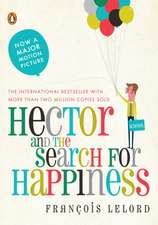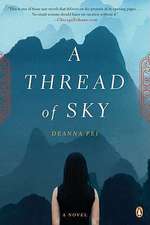The Turtle Warrior
Autor Mary Relindes Ellisen Limba Engleză Paperback – 31 dec 2004 – vârsta de la 18 ani
The Turtle Warrior is the story of the Lucas family, who live in a beautiful and remote part of Wisconsin inhabited by working-class European immigrants and the Ojibwe. By 1967 the Lucas farm has fallen into disrepair, thanks to the hard drinking of John Lucas, who brutalizes his wife and two sons. When the eldest, James, escapes by enlisting to fight in Vietnam, he leaves young Bill alone to protect his mother with only his own will and the spirit of his brother to guide him. Beautifully written and deeply felt, The Turtle Warrior takes readers from the heartland of America to the battlefields of World War II and Vietnam weaving a haunting tale of an unforgettable world where the physical and spiritual, the past and the present, merge.
Preț: 138.45 lei
Nou
Puncte Express: 208
Preț estimativ în valută:
26.49€ • 27.73$ • 21.92£
26.49€ • 27.73$ • 21.92£
Carte disponibilă
Livrare economică 17-31 martie
Preluare comenzi: 021 569.72.76
Specificații
ISBN-13: 9780143034520
ISBN-10: 0143034529
Pagini: 368
Dimensiuni: 147 x 201 x 18 mm
Greutate: 0.26 kg
Editura: Penguin Books
ISBN-10: 0143034529
Pagini: 368
Dimensiuni: 147 x 201 x 18 mm
Greutate: 0.26 kg
Editura: Penguin Books
Recenzii
This powerful novel will affect you deeply and linger long. —Sue Monk Kidd, author of The Secret Life of Bees
Ellis has produced a passionate, heartfelt book that heralds what I hope will be a long career as a writer. —Chicago Tribune
Strong, bold... Astonishing and eloquent. —Pat Conroy
Ellis has produced a passionate, heartfelt book that heralds what I hope will be a long career as a writer. —Chicago Tribune
Strong, bold... Astonishing and eloquent. —Pat Conroy
Notă biografică
Mary Relindes Ellis’s stories have been anthologized in Uncommon Waters: Women Write About Fishing; Bless Me, Father: Stories of Catholic Childhood; The Year’s Best Fantasy and Horror; and Gifts of the Wild: A Woman’s Book of Adventure.
Visit Mary Relindes Ellis's website at www.maryrelindesellis.com.
Visit Mary Relindes Ellis's website at www.maryrelindesellis.com.
Extras
October 2000
HE STOOD NEXT TO HIS yard light and looked at his watch. It was 8:00 P.M., and he did not want to wait a moment longer, to cause them worry. He turned the light switch on and then off, waiting for a few seconds before doing it again: on and off. It was a signal to his younger neighbor that all was well at the Morriseau farm. A nightly ritual.
It was dark and cold, but rather than go into the house, he leaned against the light post. Autumn again. It was the season in which the memories of his father were most visceral. His father had been dead for fifty years. Ernie was now seventy-six. Autumn made him more aware of his mortality, yet his chest swelled with excitement, with the change arousing his senses. The spice and funk of wet bark and wet leaves, the papery fertility of dried grass and the astringency of pine. The leaves like varying shades of fire. The first October storm that released them like smoke. The surprising loveliness of bare branches reaching upward as though the sky had pulled their shirts off to get them ready for bed.
Autumn briefly transcended the truth of his age and allowed him to dwell in the memory of being a treasured late-in-life child. He had loved and respected his mother and father; had been the child of, and witness to, an extraordinary marriage. In trying to be what he thought was a good son, a citizen of the world, he had made choices that hurt his parents and caused them worry and pain, some of them inevitable but others selfishly ill considered. He hadn’t paid attention. He only half listened in the evenings when his father told stories and anecdotes while they did chores. Stories of his father’s life on the reservation, stories of why the moon was full once a month, why birds go south, the creation of butterflies. He understood and listened to his parents speak in what should have been his first language, Ojibwe. Ernie knew only a half dozen words, as his generation was not allowed to speak their native language in school. If he had listened more closely and learned, he might have solved the riddle that his father unwittingly left him with and that troubled him for years.
They had been deer hunting that day and had stopped to drink some water and eat their packed sandwiches.
“Spring,” his father commented out of the blue, looking up at the treetops, “is the season of women and birth. Fall is the season of men and hunting.”
Ernie was sixteen then and did not think to question its meaning, but it was odd enough for him to remember.
His father suffered a stroke two weeks after Ernie came home from fighting in the Pacific in 1944. Ernie had gotten married just before returning to Olina. Rather than have a honeymoon, he and his wife were suddenly faced with the responsibility of his family’s subsistence farm and the care of his aging parents as well. In those long days of work there never seemed to be time to discuss much of anything except what was necessary. He was hesitant to do so anyway; afraid that he might upset the old man by forcing him to speak when it was so difficult for his father to ask for the simplest needs and wants. His wife’s nursing of his father and her patience with the daily physical therapy required appeared to have nearly restored him. Just when it seemed his father had regained all of his speech and could walk without help, he suffered a fatal stroke one night in his sleep.
Ernie told his mother, not long before she died two years later, what his father had said, in the hopes that she would know the intent of the words. Her usually good-humored face folded in confusion.
“I don’t know.” She shook her head. “I don’t know what he meant.”
He would have given anything to talk to his father again. To ask the older man if he had really understood what he had said: that women belonged to life and that men belonged to death and that men killed in the fall what women gave birth to in the spring. Even if it was not literally true, the metaphor was a terrifying one.
He put his bare hands in his coat pockets and looked up at the night sky with its many stars and constellations. He shivered. Peace did not come with old age. The new millennium meant nothing to him. He and his wife had gone to bed early on New Year’s Eve, ignoring the national fear of being bombed, of terrorism striking anywhere and everywhere. They did not, as some of their neighbors did, buy cases of water, load up on canned goods, buy huge power generators, or turn their basement into a bunker. They slept, knowing that whatever would happen would happen regardless of what they did.
His right hand fingered the handkerchief in his pocket. If he had learned something profound in his life, it was this: that to ask a question could be the most rebellious of acts and the most necessary. That allowing words to go unspoken could cause not only harm to oneself but harm to another.
He tasted it every day in his mouth. As though he had bitten down on a prickly ash berry. The sudden infusion of wild citrus flavor before it numbed his gums and tongue. Not even water seemed to wash it away.
Bitterness.
HE STOOD NEXT TO HIS yard light and looked at his watch. It was 8:00 P.M., and he did not want to wait a moment longer, to cause them worry. He turned the light switch on and then off, waiting for a few seconds before doing it again: on and off. It was a signal to his younger neighbor that all was well at the Morriseau farm. A nightly ritual.
It was dark and cold, but rather than go into the house, he leaned against the light post. Autumn again. It was the season in which the memories of his father were most visceral. His father had been dead for fifty years. Ernie was now seventy-six. Autumn made him more aware of his mortality, yet his chest swelled with excitement, with the change arousing his senses. The spice and funk of wet bark and wet leaves, the papery fertility of dried grass and the astringency of pine. The leaves like varying shades of fire. The first October storm that released them like smoke. The surprising loveliness of bare branches reaching upward as though the sky had pulled their shirts off to get them ready for bed.
Autumn briefly transcended the truth of his age and allowed him to dwell in the memory of being a treasured late-in-life child. He had loved and respected his mother and father; had been the child of, and witness to, an extraordinary marriage. In trying to be what he thought was a good son, a citizen of the world, he had made choices that hurt his parents and caused them worry and pain, some of them inevitable but others selfishly ill considered. He hadn’t paid attention. He only half listened in the evenings when his father told stories and anecdotes while they did chores. Stories of his father’s life on the reservation, stories of why the moon was full once a month, why birds go south, the creation of butterflies. He understood and listened to his parents speak in what should have been his first language, Ojibwe. Ernie knew only a half dozen words, as his generation was not allowed to speak their native language in school. If he had listened more closely and learned, he might have solved the riddle that his father unwittingly left him with and that troubled him for years.
They had been deer hunting that day and had stopped to drink some water and eat their packed sandwiches.
“Spring,” his father commented out of the blue, looking up at the treetops, “is the season of women and birth. Fall is the season of men and hunting.”
Ernie was sixteen then and did not think to question its meaning, but it was odd enough for him to remember.
His father suffered a stroke two weeks after Ernie came home from fighting in the Pacific in 1944. Ernie had gotten married just before returning to Olina. Rather than have a honeymoon, he and his wife were suddenly faced with the responsibility of his family’s subsistence farm and the care of his aging parents as well. In those long days of work there never seemed to be time to discuss much of anything except what was necessary. He was hesitant to do so anyway; afraid that he might upset the old man by forcing him to speak when it was so difficult for his father to ask for the simplest needs and wants. His wife’s nursing of his father and her patience with the daily physical therapy required appeared to have nearly restored him. Just when it seemed his father had regained all of his speech and could walk without help, he suffered a fatal stroke one night in his sleep.
Ernie told his mother, not long before she died two years later, what his father had said, in the hopes that she would know the intent of the words. Her usually good-humored face folded in confusion.
“I don’t know.” She shook her head. “I don’t know what he meant.”
He would have given anything to talk to his father again. To ask the older man if he had really understood what he had said: that women belonged to life and that men belonged to death and that men killed in the fall what women gave birth to in the spring. Even if it was not literally true, the metaphor was a terrifying one.
He put his bare hands in his coat pockets and looked up at the night sky with its many stars and constellations. He shivered. Peace did not come with old age. The new millennium meant nothing to him. He and his wife had gone to bed early on New Year’s Eve, ignoring the national fear of being bombed, of terrorism striking anywhere and everywhere. They did not, as some of their neighbors did, buy cases of water, load up on canned goods, buy huge power generators, or turn their basement into a bunker. They slept, knowing that whatever would happen would happen regardless of what they did.
His right hand fingered the handkerchief in his pocket. If he had learned something profound in his life, it was this: that to ask a question could be the most rebellious of acts and the most necessary. That allowing words to go unspoken could cause not only harm to oneself but harm to another.
He tasted it every day in his mouth. As though he had bitten down on a prickly ash berry. The sudden infusion of wild citrus flavor before it numbed his gums and tongue. Not even water seemed to wash it away.
Bitterness.
Descriere
Beautifully written and deeply felt, "The Turtle Warrior" takes readers from the heartland of America to the battlefields of World War II and Vietnam, weaving a haunting tale of an unforgettable world where the physical and spiritual, the past and the present, merge.
